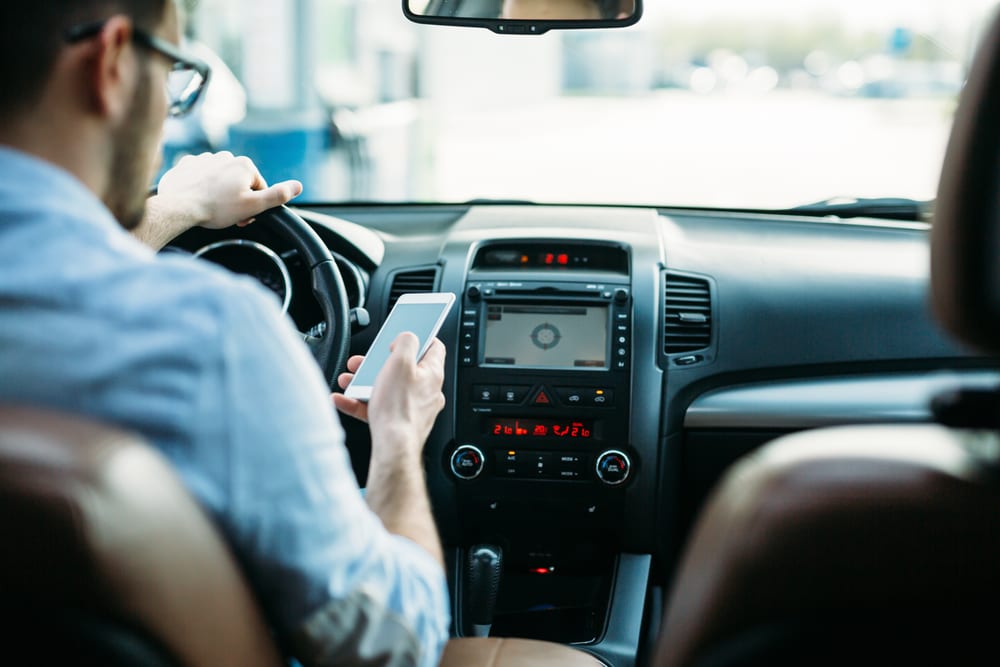 You’re driving to a friend’s house. Your phone is in your bag on the passenger seat. While waiting at a red light, you hear the unmistakable sound of a text message and see the screen’s light shining up at you invitingly. The light is still red, and you might have time to read it. You reach over and grab the phone. It’s your friend asking if you’re bringing your partner. You’re not, and you feel the need to reply. Now the light is green, so you cradle the phone in one hand and steer with the other, typing as many characters as you can between quick glances at the road. Your mind is trying to both answer and drive, and meanwhile, you’re spelling everything wrong and getting frustrated.
You’re driving to a friend’s house. Your phone is in your bag on the passenger seat. While waiting at a red light, you hear the unmistakable sound of a text message and see the screen’s light shining up at you invitingly. The light is still red, and you might have time to read it. You reach over and grab the phone. It’s your friend asking if you’re bringing your partner. You’re not, and you feel the need to reply. Now the light is green, so you cradle the phone in one hand and steer with the other, typing as many characters as you can between quick glances at the road. Your mind is trying to both answer and drive, and meanwhile, you’re spelling everything wrong and getting frustrated.
This is not an unusual scene, and while our brains know deep down that this information is not that important, we want to text back anyways. Some common advice to avoid this bad habit is to turn your phone off or place it out of reach. But wouldn’t it be great to kick the habit for good? After all, trying to text while driving isn’t enjoyable, it’s stressful.
Judson Brewer has an idea. He is an expert at breaking bad habits, and he says that texting while driving is as much as a compulsion as smoking or stress eating. Our brains have a great capacity to multitask, he points out. This means that even when we want to pay attention to something like driving, we aren’t using all of our brain power. The rest of our mind drifts off and searches for a distraction, and we tend to find it in our phones. (Watch Judson Brewer’s Ted talk here)
This all boils down to reward-based learning. For example, when we see we have a message, we know we will experience satisfaction by reading it. We like the feeling of receiving a response, and we want to know what it is. Once we know what it is, we want to reply. This is how habits form. Pavlov learned that by ringing a bell and then feeding his dog, he could eventually ring the bell and the dog would salivate, having made the connection between the bell and food. The dog is us, and the bell is our text message.
We can force ourselves to quit bad habits by avoiding cigarettes, bad food, and by turning off our phones. Or, suggests Brewer, we can get curious. Why, he asks, don’t we take those feelings that make us bend to our compulsions and use them to help us overcome those compulsions?
Here’s how it works. When your phone buzzes, let it, and pay attention to your reaction. What happens in your body? Cravings, after all, are just a series of body sensations. Maybe you feel your abdomen stiffen, or you feel an intense desire to look over at the phone. Maybe your throat tightens, your heart races, or your mind fills with possibilities. Then, maybe look at it. What do you feel now? Maybe relief that you’ve read it, followed by a surprising amount of anxiety. Where do you feel that anxiety, and what is it pushing you to do?
The great thing about curiosity is that it is rewarding in and of itself. Once we expose the craving for what it is, a bunch of sensations in the body, we can start to overcome them one by one. By focusing on our own reactions rather than the phone, we can become disinterested in it, and even start to connect the buzz of a text message with the feeling of anxiety that follows.
The next time you’re driving and somebody texts you, leave it out in the open and try out this exercise. If you want to go all the way, set a really loud and annoying ring for it, so that it’s unmistakable. Try to step out of the experience as it usually happens. Instead of seeing a text message and compulsively texting back, take a moment to pay attention to what your body is telling you. Change the reward, and start to feel joy in not responding back.
 Jason Baxter
Jason Baxter